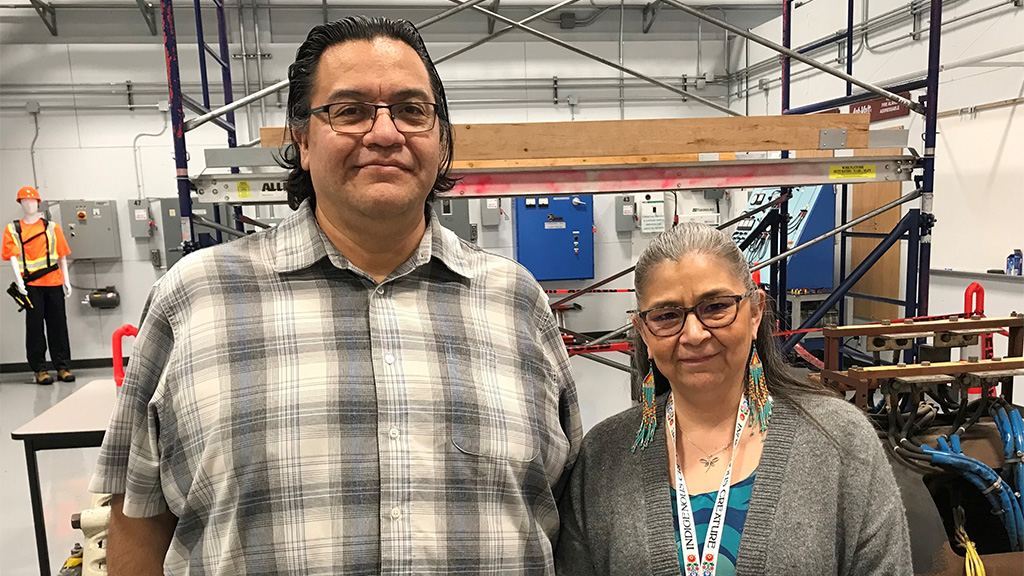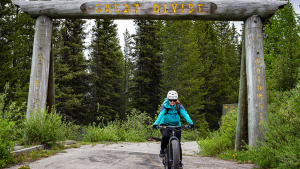Historically, Canada’s education system has not been kind to Indigenous Canadians, but the situation is shifting.
At Saanich’s Camosun College, the Indigenous Peoples in Trades Training Initiative (IPTT) is using third-party funding to provide ongoing support for Indigenous students.
In January, Camosun’s Empowering Indigenous Students in Trades program received $500,000 from the TD Bank Group. In 2021, the initiative received $100,000 from the Dennis & Phyllis Washington Foundation.
The monies have been used for various supports for Indigenous students in trades’ programs, including tuition assistance, food, transportation, child care, work clothing and equipment, books, housing and for cultural activities.
“It’s been quite a game-changer,” says Larry Underwood, from the Tsawout First Nation and one of IPTT’s three co-ordinators.
In the past, supports for Indigenous students lasted the first session of their trades’ studies. Now, help is available throughout training.
“This (money) allows us to address any level,” says Susan Wilson, also a co-ordinator, from the Cowichan Nation.
As well, the TD money has provided enough funds to hire a third co-ordinator, Lorri Leonard, from Kamloops’ Tkʼemlúps te Secwépemc First Nation.
Many new students require support when starting their Red Seal path, but Indigenous students often come with broader needs.
Both of Underwood’s parents attended residential schools, but he went to public schools in the Victoria area in the 1980s and ‘90s.
A hard-working, intelligent student, Underwood did not have an easy time.
“People didn’t believe I was smart as I was,” he recalls.
Not only did teachers cast doubt on his abilities, Indigenous classmates would call him a “nerd” because he didn’t fit the template.
“All my friends were getting kicked out, or dropping out,” he says.
Underwood went on to graduate and later spent more than 20 years as a data base administrator.
Wilson’s experiences were different, but the pain and prejudice remained present. Four years ago, she found out she attended an Indian Day School, but she’s blocked it out of her mind and cannot remember the experience.
Which is why she and Underwood, who also worked in the trades, can relate to the students.
“We’re the go-to for students,” says Wilson, formerly a professional baker/chef. “We meet students where they’re at and draw from our own life experience.”
In March, there were 24 students in the IPTT program, predominantly males, with the electrician and professional cook programs highly popular.
In previous years, there were more female students and carpentry was the favoured course. And interest in IPTT is growing, Wilson says.
Recently, the first female Indigenous electrician earned her Red Seal.
“Think of the barriers for women in the trades,” Wilson says. “Try being an Indigenous woman.”
For Underwood, Wilson and now Leonard, there are no typical days at work. It could be back-to-back meetings or solving back-to-back student concerns.
If a student has missed a few days of school, the co-ordinators follow up and find out why and if necessary, provide help.
For some students, arriving in the city is culture shock, which can be amplified if they don’t know anyone. Some students become program-jumpers, going from course to course and never finish or taking nine years to earn their Red Seal.
Underwood and Wilson, who have worked together for eight years, provide the support and guidance. “We’ve had so many bloom,” Wilson says. “They’re our seedlings. We’re like the campus aunt and uncle.”
Also important is the cultural component where activities such as a drum workshops are held, or else elders visit.
“We look to students, ask them what they need,” Wilson says.
One misconception is that Indigenous students get all of their education and living expenses paid for. There are limited programs, but they are quickly exhausted and usually apply to only Status Indians. Many students are left wanting.
It took a year of leg work to get the half-million from the TD Bank Group and, based on the needs, efforts have already started to find further financial supports. Underwood and Wilson credit Alyson Dahl, a fundraising professional at Camosun, with helping to secure donations.
“We need to continue to be proactive in supplying students’ needs, not for just three months,” Wilson says, three months being the duration of a trades sampler program.
As Underwood explains, his grandmother played an important role in his life; she had high expectations for her clever grandson, which caused him anxiety.
So he’s highly aware of what Indigenous students need.
“It’s about relationships. One of the biggest parts is getting the most out of the person,” he says.











Recent Comments
comments for this post are closed